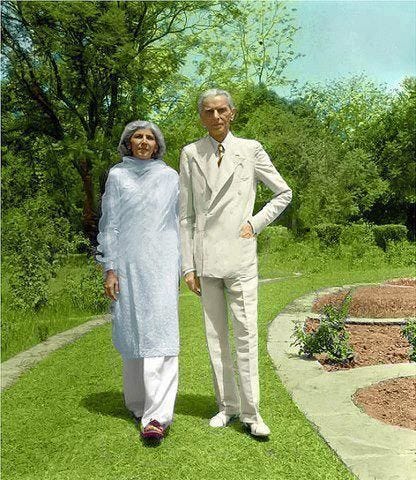Women’s Day
On the occasion of International Women's Day, we are reminded of a sentiment once expressed by Harold MacMillan, a former British Prime Minister, "No man succeeds without a good woman behind him." I wholeheartedly subscribe to this quote, albeit with a minor yet significant modification—substituting "beside" him in place of "behind" him. Jinnah's life serves as a testament to this notion—though I suggest a subtle refinement: Jinnah derived his strength not from women positioned behind him, but from those who stood shoulder to shoulder with him.
Jinnah's life was graced by several significant women, seven in particular. Regrettably, scant details are known about them, their stories fragmented and scarce. For instance, Mithibai, Jinnah's mother and arguably the most pivotal figure in his life, remains largely an enigma. Even Hector Bolitho, in his 1954 biography "Jinnah: Creator of Pakistan," lamented that she was "never more than a vague shadow in the story."
This article attempts to sketch brief profiles of the women closest to Jinnah, drawing from various snippets available about him.
Mother: Mithibai
Mithibai, from a reputable Ismaili Khoja family in Dhaffa, Kathiawar, wed Jinnabhai in 1874. Their union, as Fatima Jinnah notes in her 1987 book "My Brother," was cherished, with Jinnabhai lavishing "all his attention and care on his young wife." Mithibai's influence over her husband was apparent, softening his occasional stubbornness with her pleas.
Their challenging start in Karachi saw them enduring harsh conditions in a modest dwelling, yet Mithibai's resilience was unwavering. Here, she gave birth to Mohammad Ali, her beloved son, whom she was convinced was destined for greatness. Her encouragement and insistence on education were instrumental in his formative years. Mithibai's parting words to Jinnah, as recounted by Fatima, imbued him with a sense of destiny and protection, a maternal prophecy that fuelled his ambition.
Paternal Aunt: Manbai
Manbai, Jinnah's paternal aunt, held a special place in his heart, akin to a mother's love. Her home in Bombay was a haven for a young Jinnah, where he absorbed the city's culture and vibrancy, setting the stage for his later life and career. Manbai's storytelling and nurturing had a profound impact on him, a bond that lasted a lifetime.
First Wife: Emibai
Emibai, whom Jinnah married at the tender age of 15, was a traditional village girl, her life with Jinnah cut tragically short. Their marriage, vibrant with rituals and customs, was brief, as Jinnah soon departed for England, and Emibai passed away shortly thereafter. This loss marked a period of solitude for Jinnah, one that would last until he met Rattanbai, 25 years later.
Second Wife: Rattanbai
Rattanbai, known as 'Ruttie', was the sophisticated and intellectual partner who married Jinnah in 1918, defying age and religious divides. Their marriage was a blend of love and literary exploration, but it was also marked by differing life aspirations. Their romance, albeit troubled, never waned, evidenced by Rattanbai's heartrending farewell letter before her untimely death at 29. Jinnah's grief was palpable, his solitude in love enduring until the end.
Sister: Fatima Jinnah
Fatima Jinnah, significantly younger than Jinnah, was more a ward than a sibling. Jinnah's guardianship ensured her education and development, reflecting his progressive views on women's roles in society. She remained a steadfast companion, supporting him in both personal and political arenas.
Daughter: Dina Jinnah
Dina Jinnah, born in the bloom of Jinnah's marriage to Rattanbai, experienced the joys of a close relationship with her father during her early years. However, her choice of a non-Muslim husband strained their bond, leaving an indelible mark on Jinnah's personal life.
Friend: Sarojini Naidu
Sarojini Naidu, a distinguished poetess and political figure, was Jinnah's cherished friend. Her admiration for Jinnah was profound, and she respected but often debated his vision in both literary and political spheres.
These women, from varied backgrounds and times, were united in their strength and individuality. Their stories, though not fully known, echo the respect Jinnah had for strong-willed women, revealing the depth of his relationships beyond the public eye.






